Threats to Pangolins & Pangolin Conservation
- Lisbeth
- Site Admin
- Posts: 67396
- Joined: Sat May 19, 2012 12:31 pm
- Country: Switzerland
- Location: Lugano
- Contact:
Re: Pangolin Poaching
Such cruelty 
"Education is the most powerful weapon which you can use to change the world." Nelson Mandela
The desire for equality must never exceed the demands of knowledge
The desire for equality must never exceed the demands of knowledge
- Lisbeth
- Site Admin
- Posts: 67396
- Joined: Sat May 19, 2012 12:31 pm
- Country: Switzerland
- Location: Lugano
- Contact:
Re: Threats to Pangolins
Tragedy as 'surprise' endangered pangolin pup doesn't survive second night
Riaan Grobler | 15.11.2019
A pleasant surprise has turned into tragedy following the death of a pangolin pup barely 24 hours after it was born.
On Tuesday, one of the endangered pangolins in the care of the Johannesburg Wildlife Veterinary Centre (JWVC) unexpectedly gave birth to the pup, which was called Mishwa - "surprise" in Shona.
The JWVC treats a variety of wild animals found in urban areas or rescued during sting operations. Among these are pangolins, which are poached at an alarming rate for their scales.
In fact, the threat to these animals is so severe that no pangolins are kept on the JWVC's premises. They temporarily reside in a guarded and secure location.
"Being reclusive solitary animals, Temmincks ground pangolins (Smutsia temminckii) are placed under enormous stress when poached from their wild habitat to be sold in the illegal wildlife trade," the JWVC writes on its Facebook page.
"In addition to stress, poached pangolins are often kept in terrible conditions, often involving efforts to disguise their unique smell in attempts to keep them hidden from authorities. They are often starved too, for days, as they only eat a specific diet while foraging. All this severely threatens their survival and enormous amounts of stress compromises their health. This can result in organs shutting down, meaning the poor pangolins untimely death.
"In addition to this, should the pangolin be pregnant, this might result in the early birth of their baby. Premature births often don't survive - thus adding a further threat to our pangolin population - the future generation."
On Wednesday, after checking on mom Ellie and baby Mishwa, the centre's resident veterinarian Dr Karin Lourens found Mishwa was cold and weak. While her mom Ellie was feeding her, it seemed that she was not able to produce enough milk for little Mishwa.
"When I weighed the pup, she was 30g lighter than at birth, which was concerning," Lourens told News24.
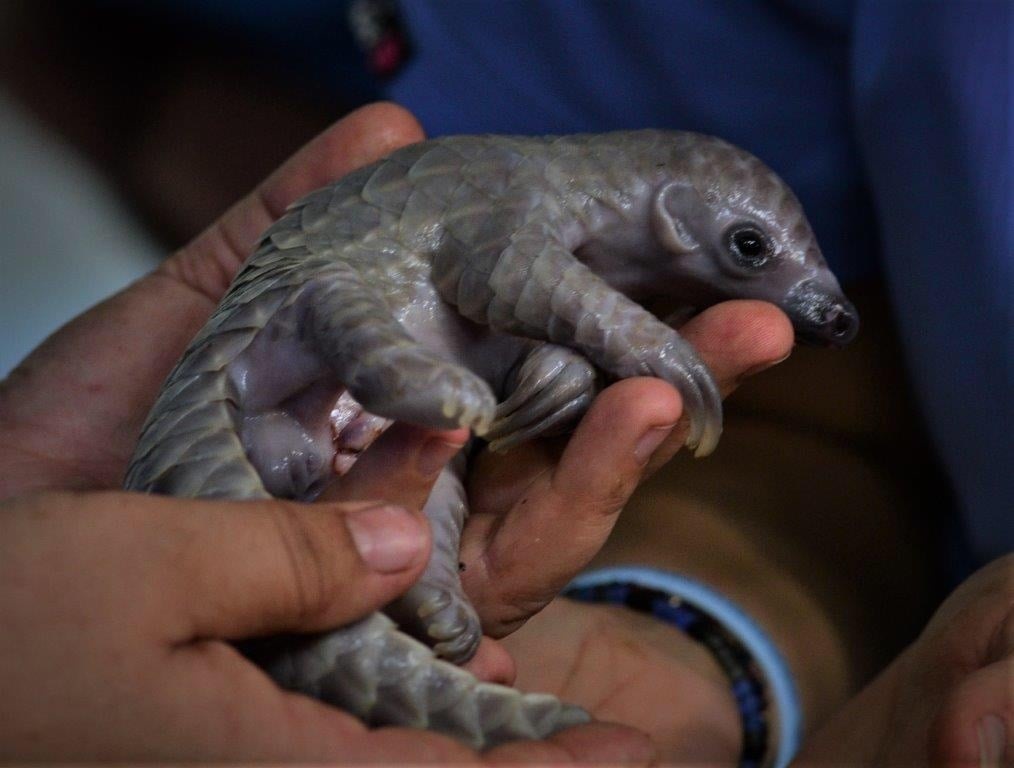
Dextrose and a drip were administered to the little pup to build her strength and energy levels, and she was support-fed throughout the night. Despite this, she seemed to get weaker and weaker and did not survive the night.
Devastated
According to Lourens, if a pup is born too early, their lungs are underdeveloped, which results in them only surviving between 24 and 48 hours.
"While we knew this was a huge possibility, we still held on to the hope that she would be okay.
"Our team is devastated. We experience the trauma from the illegal wildlife trade on a regular basis. Mishwa was a bundle of hope in a dire crisis we face in trying to save this species among caring for all the other wildlife critters that come our way."
Pangolins, according to Lourens, are considered medicinal in Asian countries – much like rhino horn.
"Last year alone, 60 tons of scales were found - that's 400 000 individual animals that were killed," Lourens says.
"Combine elephant, rhino, lions… you don't get close to that number."
According to Lourens, it is impossible to determine how many pangolins are left in the world. They are nocturnal and live underground and in enclosed areas such as caves.
"Their scales are so tough that an adult lion can't penetrate them. That's how they have survived for 80 million years, because they have no natural predator.
"They now have only one enemy – humans."
Riaan Grobler | 15.11.2019
A pleasant surprise has turned into tragedy following the death of a pangolin pup barely 24 hours after it was born.
On Tuesday, one of the endangered pangolins in the care of the Johannesburg Wildlife Veterinary Centre (JWVC) unexpectedly gave birth to the pup, which was called Mishwa - "surprise" in Shona.
The JWVC treats a variety of wild animals found in urban areas or rescued during sting operations. Among these are pangolins, which are poached at an alarming rate for their scales.
In fact, the threat to these animals is so severe that no pangolins are kept on the JWVC's premises. They temporarily reside in a guarded and secure location.
"Being reclusive solitary animals, Temmincks ground pangolins (Smutsia temminckii) are placed under enormous stress when poached from their wild habitat to be sold in the illegal wildlife trade," the JWVC writes on its Facebook page.
"In addition to stress, poached pangolins are often kept in terrible conditions, often involving efforts to disguise their unique smell in attempts to keep them hidden from authorities. They are often starved too, for days, as they only eat a specific diet while foraging. All this severely threatens their survival and enormous amounts of stress compromises their health. This can result in organs shutting down, meaning the poor pangolins untimely death.
"In addition to this, should the pangolin be pregnant, this might result in the early birth of their baby. Premature births often don't survive - thus adding a further threat to our pangolin population - the future generation."
On Wednesday, after checking on mom Ellie and baby Mishwa, the centre's resident veterinarian Dr Karin Lourens found Mishwa was cold and weak. While her mom Ellie was feeding her, it seemed that she was not able to produce enough milk for little Mishwa.
"When I weighed the pup, she was 30g lighter than at birth, which was concerning," Lourens told News24.

Dextrose and a drip were administered to the little pup to build her strength and energy levels, and she was support-fed throughout the night. Despite this, she seemed to get weaker and weaker and did not survive the night.
Devastated
According to Lourens, if a pup is born too early, their lungs are underdeveloped, which results in them only surviving between 24 and 48 hours.
"While we knew this was a huge possibility, we still held on to the hope that she would be okay.
"Our team is devastated. We experience the trauma from the illegal wildlife trade on a regular basis. Mishwa was a bundle of hope in a dire crisis we face in trying to save this species among caring for all the other wildlife critters that come our way."
Pangolins, according to Lourens, are considered medicinal in Asian countries – much like rhino horn.
"Last year alone, 60 tons of scales were found - that's 400 000 individual animals that were killed," Lourens says.
"Combine elephant, rhino, lions… you don't get close to that number."
According to Lourens, it is impossible to determine how many pangolins are left in the world. They are nocturnal and live underground and in enclosed areas such as caves.
"Their scales are so tough that an adult lion can't penetrate them. That's how they have survived for 80 million years, because they have no natural predator.
"They now have only one enemy – humans."
"Education is the most powerful weapon which you can use to change the world." Nelson Mandela
The desire for equality must never exceed the demands of knowledge
The desire for equality must never exceed the demands of knowledge
- RogerFraser
- Site Admin
- Posts: 6003
- Joined: Wed Sep 18, 2013 9:36 pm
- Country: South Africa
- Location: Durban
- Contact:
Re: Pangolin Poaching
Smuggled pangolin scales extracted from around 50,000 pangolins seized in China
https://www.asiaone.com/china/smuggled- ... Hi-qTfR1cE
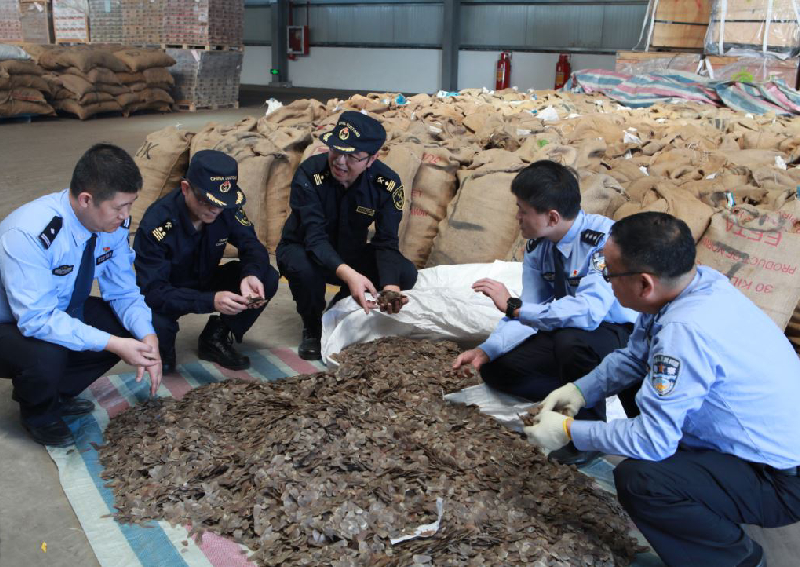
MA ZHENHUAN
CHINA DAILY/ASIA NEWS NETWORK
Dec 12, 2019
The anti-smuggling bureau of Hangzhou Customs and the public security department in Wenzhou, Zhejiang province, jointly seized over 23 metric tons of smuggled pangolin scales and detained 18 suspects in late October after one year of investigation and anti-smuggling efforts, Hangzhou Customs announced on Wednesday.
Given that only 400 to 600 grams of scales can be extracted from each pangolin, a nationally protected species, the plate-like scales seized in Wenzhou and smuggled from Busan, South Korea, in batches since November last year were estimated to be extracted from around 50,000 pangolins.
It is believed to be the largest haul of smuggled wildlife products in recent years, China Central Television reported.
In September, customs authorities in Wenzhou found that two people from the city were selling pangolin scales, which are often used in traditional Chinese medicine, in a black market in the Guangxi Zhuang autonomous region.
At the end of October, customs received a tip that a batch of scales would be smuggled into China and those two people would be involved.
"A man surnamed Cai purchased pangolin scales in Nigeria and entrusted an overseas smuggling group to transport them to Busan first. Then, the man's two partners in Wenzhou hired another group to deliver them to Wenzhou via Shanghai," said Feng Chenxue, an Hangzhou Customs official.
The containers with scales, mixed with slices of ginger, were unloaded at a wharf in Shanghai and then transferred to Wenzhou where local customs authorities seized the containers and caught the suspects, according to Feng.
"The smuggled pangolin scales were wrapped with layers of ginger slices in bags, which makes them hard to detect during routine spot checks," said Chen Ling, a policeman from Wenzhou Public Security Bureau.
The cost of pangolin scales overseas is about 80 to 150 yuan (S$15 to S$29) per kilogram, while the selling price in China could reach 800 yuan as the scales are believed to be beneficial for health, Feng said.
Hangzhou Customs said they will continue working with local public security authorities to crack down on the smuggling of wildlife and endangered species into and out of China.
https://www.asiaone.com/china/smuggled- ... Hi-qTfR1cE

MA ZHENHUAN
CHINA DAILY/ASIA NEWS NETWORK
Dec 12, 2019
The anti-smuggling bureau of Hangzhou Customs and the public security department in Wenzhou, Zhejiang province, jointly seized over 23 metric tons of smuggled pangolin scales and detained 18 suspects in late October after one year of investigation and anti-smuggling efforts, Hangzhou Customs announced on Wednesday.
Given that only 400 to 600 grams of scales can be extracted from each pangolin, a nationally protected species, the plate-like scales seized in Wenzhou and smuggled from Busan, South Korea, in batches since November last year were estimated to be extracted from around 50,000 pangolins.
It is believed to be the largest haul of smuggled wildlife products in recent years, China Central Television reported.
In September, customs authorities in Wenzhou found that two people from the city were selling pangolin scales, which are often used in traditional Chinese medicine, in a black market in the Guangxi Zhuang autonomous region.
At the end of October, customs received a tip that a batch of scales would be smuggled into China and those two people would be involved.
"A man surnamed Cai purchased pangolin scales in Nigeria and entrusted an overseas smuggling group to transport them to Busan first. Then, the man's two partners in Wenzhou hired another group to deliver them to Wenzhou via Shanghai," said Feng Chenxue, an Hangzhou Customs official.
The containers with scales, mixed with slices of ginger, were unloaded at a wharf in Shanghai and then transferred to Wenzhou where local customs authorities seized the containers and caught the suspects, according to Feng.
"The smuggled pangolin scales were wrapped with layers of ginger slices in bags, which makes them hard to detect during routine spot checks," said Chen Ling, a policeman from Wenzhou Public Security Bureau.
The cost of pangolin scales overseas is about 80 to 150 yuan (S$15 to S$29) per kilogram, while the selling price in China could reach 800 yuan as the scales are believed to be beneficial for health, Feng said.
Hangzhou Customs said they will continue working with local public security authorities to crack down on the smuggling of wildlife and endangered species into and out of China.
- Richprins
- Committee Member
- Posts: 75969
- Joined: Sat May 19, 2012 3:52 pm
- Location: NELSPRUIT
- Contact:
Re: Pangolin Poaching
3 suspects in custody for possessing pangolin body parts
2019-12-12 22:44
Ntwaagae Seleka
Parts of dead pangolins recovered from three suspects.
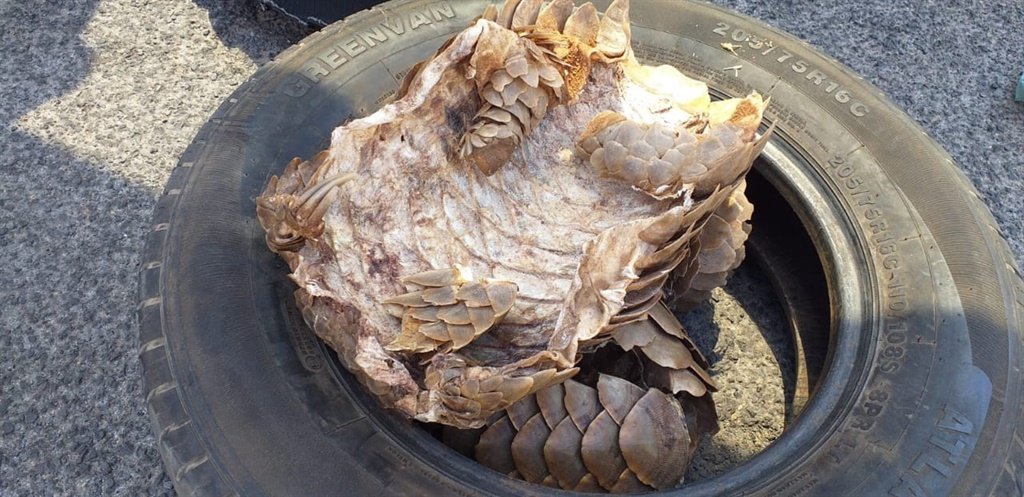
Three suspects are in custody after being nabbed with pangolin body parts in Bellville, Cape Town.
Police spokesperson Sergeant Noloyiso Rwexana said they received information about a vehicle transporting endangered animals from Gauteng to Bellville.
Rwexana said members of the Flying Squad followed up on the information and the vehicle was intercepted and pulled over on Durban Road in Bellville.
"Upon searching the vehicle, the police discovered a large amount of pangolin body parts valued at an estimated R65 500. Three men - aged 42, 47 and 57 - were arrested and are expected to appear in the Bellville Magistrate's Court soon," said Rwexana.
https://www.news24.com/SouthAfrica/News ... s-20191212
2019-12-12 22:44
Ntwaagae Seleka
Parts of dead pangolins recovered from three suspects.

Three suspects are in custody after being nabbed with pangolin body parts in Bellville, Cape Town.
Police spokesperson Sergeant Noloyiso Rwexana said they received information about a vehicle transporting endangered animals from Gauteng to Bellville.
Rwexana said members of the Flying Squad followed up on the information and the vehicle was intercepted and pulled over on Durban Road in Bellville.
"Upon searching the vehicle, the police discovered a large amount of pangolin body parts valued at an estimated R65 500. Three men - aged 42, 47 and 57 - were arrested and are expected to appear in the Bellville Magistrate's Court soon," said Rwexana.
https://www.news24.com/SouthAfrica/News ... s-20191212
Please check Needs Attention pre-booking: https://africawild-forum.com/viewtopic.php?f=322&t=596
- Lisbeth
- Site Admin
- Posts: 67396
- Joined: Sat May 19, 2012 12:31 pm
- Country: Switzerland
- Location: Lugano
- Contact:
Re: Pangolin Poaching
Surprising that there are any left....for now 

It's too late when the animals are dead
It's too late when the animals are dead

"Education is the most powerful weapon which you can use to change the world." Nelson Mandela
The desire for equality must never exceed the demands of knowledge
The desire for equality must never exceed the demands of knowledge
- Lisbeth
- Site Admin
- Posts: 67396
- Joined: Sat May 19, 2012 12:31 pm
- Country: Switzerland
- Location: Lugano
- Contact:
Re: Threats to Pangolins
Three pangolin species closer to extinction: IUCN
by Mongabay.com on 18 December 2019
- Of the eight known species of pangolins, one of the world’s most trafficked mammals, two African species, the while-bellied (Phataginus tricuspis) and the giant ground pangolin (Smutsia gigantea), have been moved from “vulnerable” to “endangered” on the IUCN Red List.
- One Asian species, the Philippine pangolin (Manis culionensis), has been uplisted from “endangered” to “critically endangered”, according to the latest update by the International Union for Conservation of Nature (IUCN).
- The other species remain in their respective threatened categories and haven’t improved in status.
The pangolin’s future looks gloomy, according to the latest update by the International Union for Conservation of Nature (IUCN), which assesses the conservation status of species.
Of the eight known species of the pangolin, one of the world’s most trafficked mammals, two African species, the while-bellied (Phataginus tricuspis) and the giant ground pangolin (Smutsia gigantea), have been moved from “vulnerable” to “endangered” on the IUCN Red List. One Asian species, the Philippine pangolin (Manis culionensis), has been uplisted from “endangered” to “critically endangered.” No species improved in status in the assessment.
Much of the decline in the armor-clad mammals can be attributed to the loss of their habitat and large-scale poaching for the animals’ scales and meat, experts say.
“It is extremely disheartening but unsurprising that three additional pangolin species are now formally classified as endangered and critically endangered,” Audrey Delsink, Africa wildlife director of Humane Society International, said in a statement.
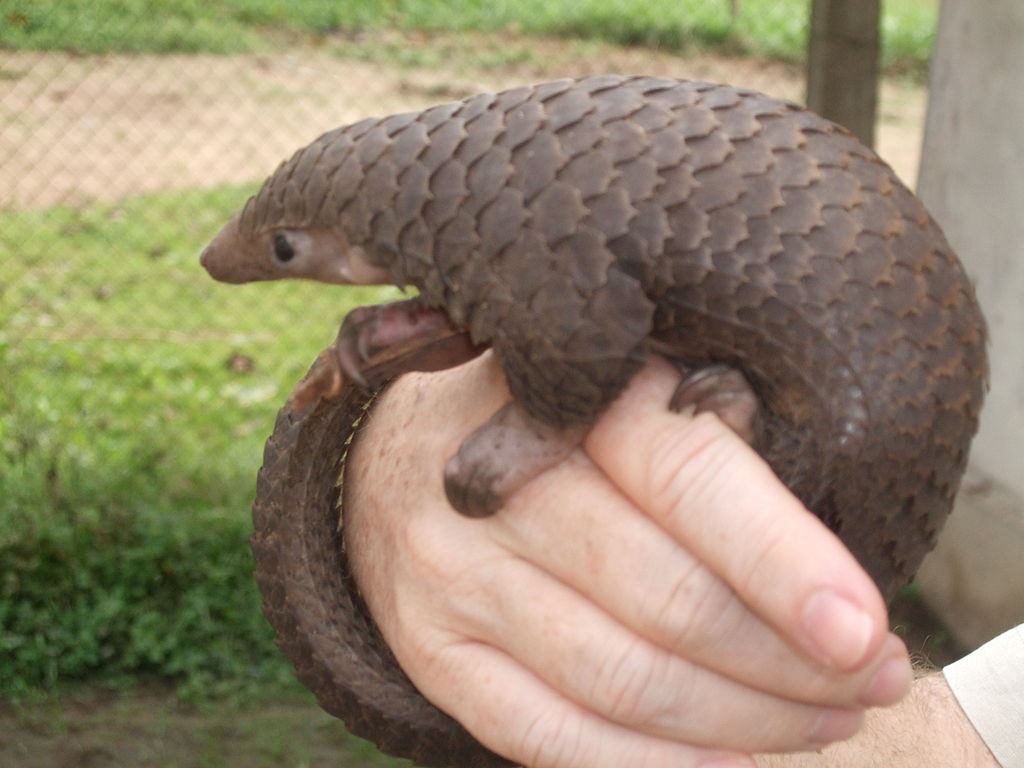
White-bellied pangolin (Phataginus tricuspis) in the central Democratic Republic of the Congo. Image by Valerius Tygart via Wikimedia Commons (CC BY-SA 3.0).
Pangolin scales, largely made of keratin just like human fingernails, are sought after in Asian markets, mainly China and Vietnam, where people erroneously believe the scales have medicinal properties, such as promoting menstruation and lactation and in treating rheumatism and arthritis.
The shy mammals are also hunted for bushmeat in Africa, although in China, pangolin meat is consumed both as a luxury food item and for its purported curative properties. In 2016, countries voted to list all eight species of pangolin on CITES Appendix I, banning commercial trade in the animals. Yet, widespread trafficking of their body parts continues.
Despite the rampant poaching, researchers know little about pangolins, also known as scaly anteaters, because they eat ants and termites. The animals are nocturnal and difficult to survey, and there isn’t a whole lot of quantitative information about their population status in the wild. What conservationists do know, however, is that both the live animal and its scales, meat, and other body parts keep appearing in illegal wildlife seizures around the world. Between 2000 and 2019, for instance, at least 850,000 pangolins were trafficked internationally, a recent study found.
Every species of pangolin is threatened with extinction, and their status is only getting worse. Three of the four Asian pangolins — the Chinese pangolin (Manis pentadactyla), Sunda pangolin (Manis javanica), and Philippine pangolin — are critically endangered, while the Indian pangolin (Manis crassicaudata) is listed as endangered on the IUCN Red List.
All four African species — the Cape or Temminck’s ground pangolin (Smutsia temminckii), white-bellied or tree pangolin, giant ground pangolin and black-bellied or long-tailed pangolin (Phataginus tetradactyla) — were previously listed as vulnerable. The latest IUCN update moves two of these species to a higher threat category.
The pangolins’ decline comes from both the widespread loss of their forest habitat and increased targeting by poachers, following the decline in Asian pangolin numbers, the IUCN Species Survival Commission (SSC) Pangolin Specialist Group noted in the species’ assessments.
“Pangolins continue to get hammered by poaching and trade, and extinction is on the horizon for these adorably odd creatures,” Sarah Uhlemann, international program director at the Center for Biological Diversity, said in a statement.
Adam Peyman, wildlife programs and operations manager for Humane Society International, added, “The new Red List assessments illustrate the urgent need for action to stop these charming animals from slipping into extinction … The trafficking network is global, and so must our response be to save the pangolin.”
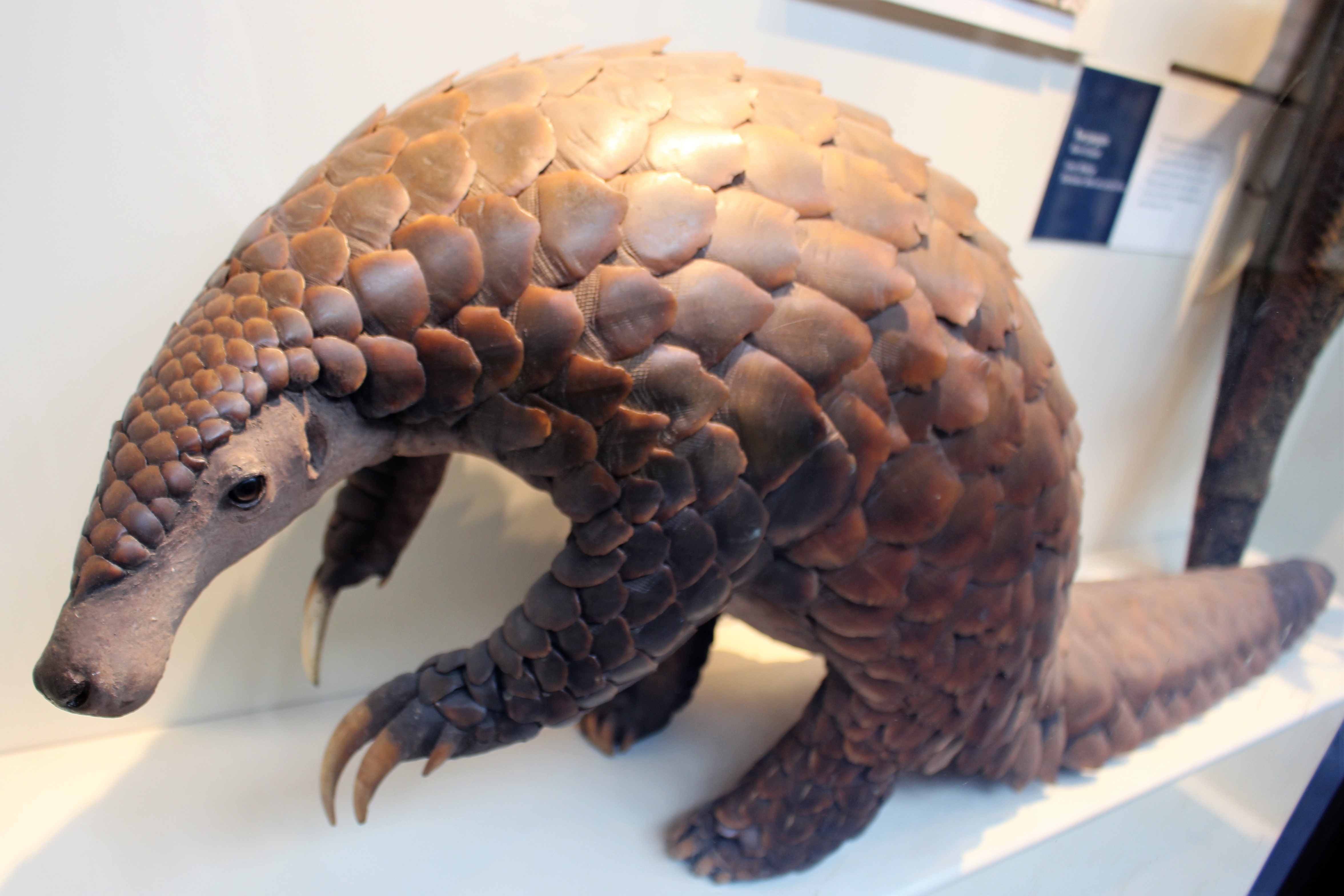
Taxidermied giant pangolin (Smutsia gigantea) at the Natural History Museum in London, England. Image by Emőke Dénes via Wikimedia Commons (CC BY-SA 4.0).
by Mongabay.com on 18 December 2019
- Of the eight known species of pangolins, one of the world’s most trafficked mammals, two African species, the while-bellied (Phataginus tricuspis) and the giant ground pangolin (Smutsia gigantea), have been moved from “vulnerable” to “endangered” on the IUCN Red List.
- One Asian species, the Philippine pangolin (Manis culionensis), has been uplisted from “endangered” to “critically endangered”, according to the latest update by the International Union for Conservation of Nature (IUCN).
- The other species remain in their respective threatened categories and haven’t improved in status.
The pangolin’s future looks gloomy, according to the latest update by the International Union for Conservation of Nature (IUCN), which assesses the conservation status of species.
Of the eight known species of the pangolin, one of the world’s most trafficked mammals, two African species, the while-bellied (Phataginus tricuspis) and the giant ground pangolin (Smutsia gigantea), have been moved from “vulnerable” to “endangered” on the IUCN Red List. One Asian species, the Philippine pangolin (Manis culionensis), has been uplisted from “endangered” to “critically endangered.” No species improved in status in the assessment.
Much of the decline in the armor-clad mammals can be attributed to the loss of their habitat and large-scale poaching for the animals’ scales and meat, experts say.
“It is extremely disheartening but unsurprising that three additional pangolin species are now formally classified as endangered and critically endangered,” Audrey Delsink, Africa wildlife director of Humane Society International, said in a statement.

White-bellied pangolin (Phataginus tricuspis) in the central Democratic Republic of the Congo. Image by Valerius Tygart via Wikimedia Commons (CC BY-SA 3.0).
Pangolin scales, largely made of keratin just like human fingernails, are sought after in Asian markets, mainly China and Vietnam, where people erroneously believe the scales have medicinal properties, such as promoting menstruation and lactation and in treating rheumatism and arthritis.
The shy mammals are also hunted for bushmeat in Africa, although in China, pangolin meat is consumed both as a luxury food item and for its purported curative properties. In 2016, countries voted to list all eight species of pangolin on CITES Appendix I, banning commercial trade in the animals. Yet, widespread trafficking of their body parts continues.
Despite the rampant poaching, researchers know little about pangolins, also known as scaly anteaters, because they eat ants and termites. The animals are nocturnal and difficult to survey, and there isn’t a whole lot of quantitative information about their population status in the wild. What conservationists do know, however, is that both the live animal and its scales, meat, and other body parts keep appearing in illegal wildlife seizures around the world. Between 2000 and 2019, for instance, at least 850,000 pangolins were trafficked internationally, a recent study found.
Every species of pangolin is threatened with extinction, and their status is only getting worse. Three of the four Asian pangolins — the Chinese pangolin (Manis pentadactyla), Sunda pangolin (Manis javanica), and Philippine pangolin — are critically endangered, while the Indian pangolin (Manis crassicaudata) is listed as endangered on the IUCN Red List.
All four African species — the Cape or Temminck’s ground pangolin (Smutsia temminckii), white-bellied or tree pangolin, giant ground pangolin and black-bellied or long-tailed pangolin (Phataginus tetradactyla) — were previously listed as vulnerable. The latest IUCN update moves two of these species to a higher threat category.
The pangolins’ decline comes from both the widespread loss of their forest habitat and increased targeting by poachers, following the decline in Asian pangolin numbers, the IUCN Species Survival Commission (SSC) Pangolin Specialist Group noted in the species’ assessments.
“Pangolins continue to get hammered by poaching and trade, and extinction is on the horizon for these adorably odd creatures,” Sarah Uhlemann, international program director at the Center for Biological Diversity, said in a statement.
Adam Peyman, wildlife programs and operations manager for Humane Society International, added, “The new Red List assessments illustrate the urgent need for action to stop these charming animals from slipping into extinction … The trafficking network is global, and so must our response be to save the pangolin.”

Taxidermied giant pangolin (Smutsia gigantea) at the Natural History Museum in London, England. Image by Emőke Dénes via Wikimedia Commons (CC BY-SA 4.0).
"Education is the most powerful weapon which you can use to change the world." Nelson Mandela
The desire for equality must never exceed the demands of knowledge
The desire for equality must never exceed the demands of knowledge
- Richprins
- Committee Member
- Posts: 75969
- Joined: Sat May 19, 2012 3:52 pm
- Location: NELSPRUIT
- Contact:
Re: Threats to Pangolins
China!
Please check Needs Attention pre-booking: https://africawild-forum.com/viewtopic.php?f=322&t=596
-
Klipspringer
- Global Moderator
- Posts: 5862
- Joined: Sat Sep 14, 2013 12:34 pm
- Country: Germany
- Contact:


